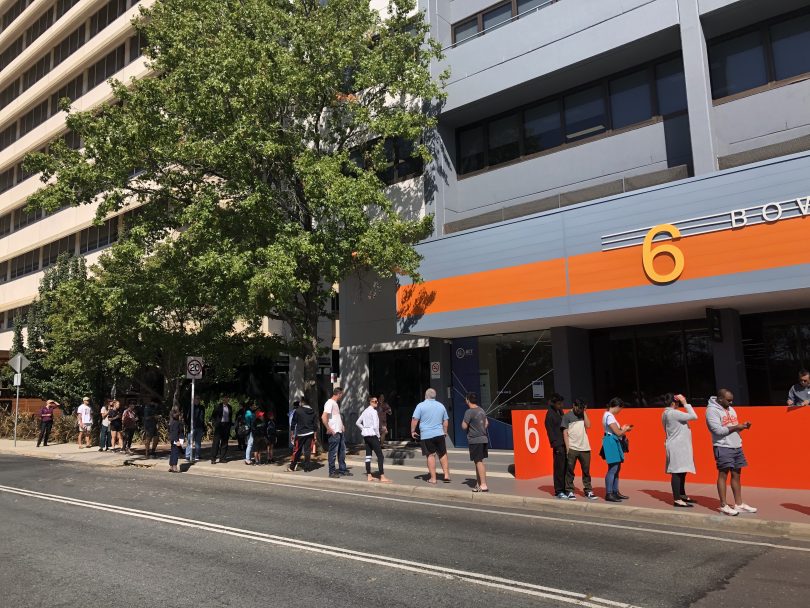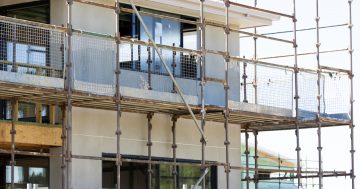
The queue for Centrelink spilled out onto the street in Woden on 23 March. Photo: Dominic Giannini.
Young workers have borne the brunt of job losses in the ACT since the start of restrictions to contain the spread of COVID-19, according to the Australian Bureau of Statistics.
New statistics on jobs and wages, based on single touch payroll data from the Australian Taxation Office, show that between 14 March and 4 April – the three-week period since Australia recording its 100th confirmed COVID-19 case – there was a 5.5 per cent fall in the number of jobs in the ACT, equal to about 13,000, with 11.4 per cent of those job losses affecting workers aged under 20.
The next most affected group was people aged 20 to 29, at 8.5 per cent.
Workers serving in cafes, restaurants, pubs, clubs and cinemas lost their jobs in droves.
The accommodation and food sector was the worst hit, with jobs falling by 21.9 per cent, followed by arts and recreation (16.7 per cent) and education and training (15.2 per cent).
An equal number of ACT males and females lost their jobs during the period surveyed.
Total wages lost between 14 March and 4 April amounted to 5.7 per cent of the total ACT wages bill, but for workers aged under 20 the figure was 20.3 per cent.
The next oldest bracket – 20 to 29 – lost 9.3 per cent.
Males workers lost more than females – 5.9 per cent compared to 5.2 per cent.
The ACT’s construction industry only lost 3.4 per cent of jobs during the period, but Master Builders ACT CEO Michael Hopkins is concerned about what may still come and is calling for further measures to support the industry and its workers.
“This is a difficult time across the industry and these figures show just a fraction of the impact of what is yet to come if more is not done by the ACT Government to assist the building and construction industry,” he said.
“The local building and construction industry has not suffered the same level of loss as some other industries, which puts us in an excellent position to be able to lead the ACT’s economic recovery effort.”
Mr Hopkins said a new Master Builders’ survey of its members showed that in the ACT, 73 per cent had seen an average fall in forward work on their books of 40 per cent.
“Governments must act now because while many builders are getting by on work that commenced prior to the onset of COVID-19, that work is fast running out and new orders have reduced,” he said.
“While we commend the ACT Government for its current efforts to support the industry, we’re calling on it to continue to keep the industry working by increasing expenditure on capital works projects. It’s vital we protect the livelihoods of the almost 20,000 Canberrans who are employed in the building and construction industry.”
Mr Hopkins also called for the cutting of red tape which hinders projects being brought to market quickly, and for the government to speed up development approvals, quickly process leasing and unit title applications, and fast-track as many regulatory processes as possible.
He urged government and private developers to go local when hiring builders, subcontractors, suppliers and consultants.
The ACT workforce has fared better than the rest of Australia during COVID-19, with the national job-loss figure at 6 per cent and jobs lost by people under the age of 20 at 10 per cent.
Tasmania and Victoria had the largest decreases in jobs, down 7.3 per cent and 6.8 per cent respectively.
The accommodation and food services industry suffered the largest reduction in jobs, down by 25.6 per cent nationally, followed by the arts and recreation services industry at 18.7 per cent.
Total wages paid by businesses slumped by 6.7 per cent during the period.





















